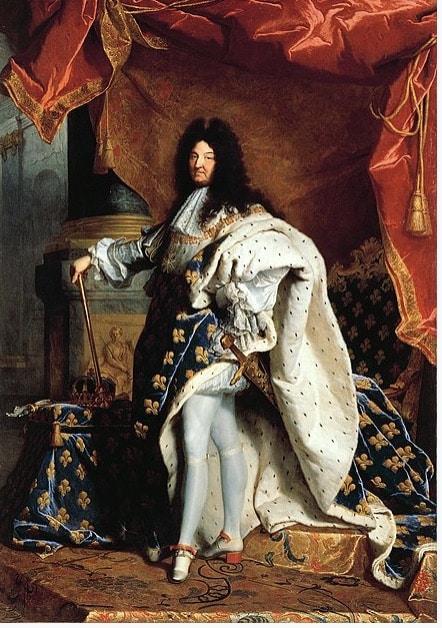
Louis XIV was born on September 5, 1638 in the Château de Saint-Germain-en-Laye, in France. In 1643, his father, Louis XIII, died and his mother Queen Anne became the Regent of France, appointing Cardinal Mazarin as her chief minister who would protect her son’s succession to the throne until he became of age. On September 7, 1651, Louis XIV was declared to have reached the age of majority and on the death of Cardinal Mazarin, ten years later, Louis became King of France and declared that he would rule without a chief minister. As King Louis XIV, he had become an absolute ruler, declaring in effect, “L’étate c’est moi.” (I am the state).
During his reign, France became the dominant military force in Europe. It gained and lost territory in a series of conflicts, including the War of Devolution, the Franco-Dutch War, the War of the League of Augsburg, and the War of the Spanish Succession. Through alliances and military victories, Louis had reached the pinnacle of his power by the mid 1680’s.
To consolidate his power and enhance his image as the absolute ruler of the most powerful nation in Europe, Louis built the elaborate Palace of Versailles featuring the spectacular Hall of Mirrors. The palace became the site of his court and the location where he housed many of his most powerful nobles, perhaps with the intent of “keeping his friends close and his potential enemies closer.”
Louis XIV was a patron of the arts. During his reign, he renovated the Louvre and engaged architects to enhance the other royal residences. He also commissioned many works of art and in 1661 founded the Royal Academy of Dance, and in 1669, the Académie d’Opéra, He also commissioned many works of art and promoted French literature by supporting Molière, Racine, La Fontaine, and other French authors. In 1670, he replaced the walls on the northern boundary of Paris with the wide tree-lined boulevards for which Paris is famous. He also introduced street lighting to make Paris, safer at night.
France reached the pinnacle of its pre-revolution glory during the reign of Louis XIV who has been described as Louis the Great (Louis le Grand) and the Sun King (le Roi Soleil). His death at the age of 76 on September 1, 1715 concluded a 72-year reign that signaled the end of rule by the Divine Right of Kings and the beginning of the Age of Enlightenment.
